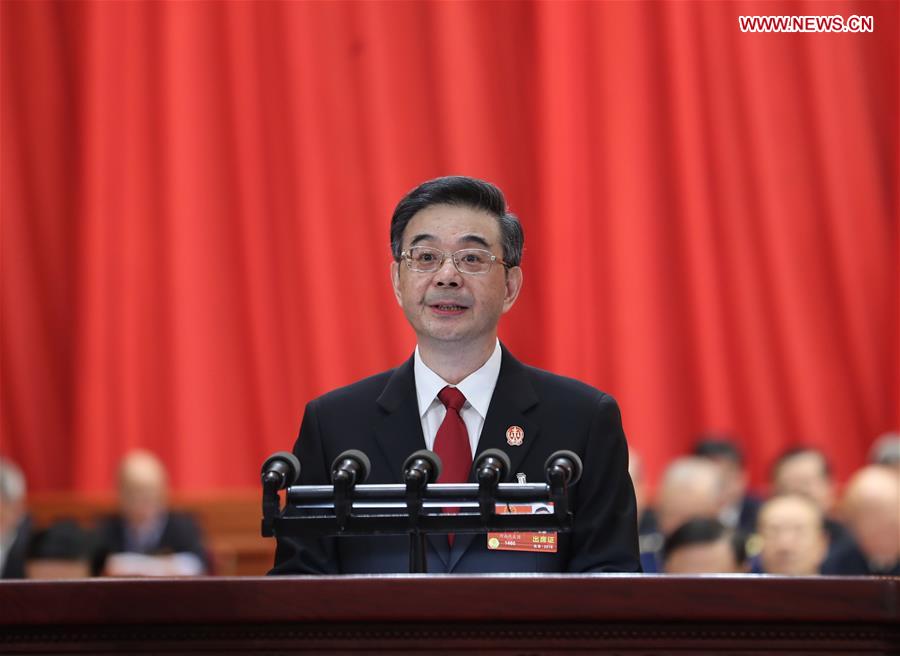


Chief Justice Zhou Qiang delivers a work report of the Supreme People's Court at the second plenary meeting of the first session of the 13th National People's Congress at the Great Hall of the People in Beijing, capital of China, March 9, 2018. (Xinhua/Wang Ye)
BEIJING, March 9 (Xinhua) -- China's judicial and procuratorial organs have maintained high pressure against graft, as the numbers of both investigated public servants and convicted high-ranking officials set records.
At a plenary meeting of the first session of the 13th National People's Congress (NPC) Friday, Chief Justice Zhou Qiang and Procurator-General Cao Jianming delivered work reports on the Supreme People's Court (SPC) and the Supreme People's Procuratorate (SPP) respectively, highlighting the anti-graft campaign progress over the past five years.
Procurators investigated 254,419 people for suspected involvement in duty-related crimes from 2013 to 2017, up 16.4 percent compared with the previous five years, Cao said in the SPP report.
Losses of over 55.3 billion yuan (8.7 billion U.S. dollars) were recovered from the concluded cases, he said.
Among the investigated, 120 are former officials at the provincial and ministerial level or above. Prosecution proceedings were launched against 105 of them, said Cao.
Graft cases involving 101 former officials at the provincial and ministerial level or above were concluded from 2013 to 2017, Zhou said in the SPC report.
Chinese courts concluded 195,000 graft cases during the period, implicating 263,000 individuals. A total of 13,000 people were convicted of offering bribes, the report read.
The case of Yang Xiuzhu, who was number one on the list of China's top 100 fugitives in an Interpol Red Notice, was heard during the period, said the chief justice.
Yang, former vice mayor of Wenzhou City, Zhejiang Province, fled China in 2003 and surrendered to police in November 2016. She was sentenced to eight years in jail for embezzlement and taking bribes in October 2017.
Chinese courts also investigated and punished 3,338 court staff members for abusing judicial and enforcement power. Cases involving 531 of them were transferred to the judicial organ.
"Drawing a profound lesson from the case of Xi Xiaoming, we resolutely punished judicial corruption with zero-tolerance," Zhou said.
Xi Xiaoming, former SPC vice president, was sentenced to life in prison for accepting bribes worth over 100 million yuan in 2017.
Since the 18th CPC National Congress held in November 2012, China has intensified measures to prevent and fight corruption, including disciplinary inspections and supervisory reform.
Supervisory commissions at the provincial, prefectural and county levels have been formed to supervise all who exercise public power. The national supervisory commission is also expected to be established at the ongoing first session of the 13th NPC.
Zhang Weiguo, an NPC deputy, said the record high number of convictions, including cases of those former high-ranking officials, have shown China's zero-tolerance for graft.
"Judging from the anti-corruption achievements over the past five years, I am confident that we can secure an overwhelming victory against graft under the leadership of the CPC," he said.

 Award-winning photos show poverty reduction achievements in NE China's Jilin province
Award-winning photos show poverty reduction achievements in NE China's Jilin province People dance to greet advent of New Year in Ameiqituo Town, Guizhou
People dance to greet advent of New Year in Ameiqituo Town, Guizhou Fire brigade in Shanghai holds group wedding
Fire brigade in Shanghai holds group wedding Tourists enjoy ice sculptures in Datan Town, north China
Tourists enjoy ice sculptures in Datan Town, north China Sunset scenery of Dayan Pagoda in Xi'an
Sunset scenery of Dayan Pagoda in Xi'an Tourists have fun at scenic spot in Nanlong Town, NW China
Tourists have fun at scenic spot in Nanlong Town, NW China Harbin attracts tourists by making best use of ice in winter
Harbin attracts tourists by making best use of ice in winter In pics: FIS Alpine Ski Women's World Cup Slalom
In pics: FIS Alpine Ski Women's World Cup Slalom Black-necked cranes rest at reservoir in Lhunzhub County, Lhasa
Black-necked cranes rest at reservoir in Lhunzhub County, Lhasa China's FAST telescope will be available to foreign scientists in April
China's FAST telescope will be available to foreign scientists in April